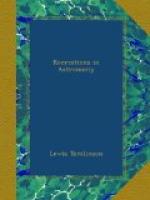We ask in vain what is the end of the present condition of things. We have read the history of our globe with great difficulty—its prophecy is still more difficult. We have asked whether the stars form a system, and if so, whether that system is permanent. We are not able to answer yet. We have said that the sun would in time become as icy cold and dead as the moon, and then the earth would wander darkling in the voids of space. But the end of the earth, as prophesied in the Word, is different: “The heavens will pass away with [Page 238] a rushing noise, and the elements will be dissolved with burning heat, and the earth and the works therein will be burned up.” The latest conclusions of science point the same way. The great zones of uncondensed matter about the sun seem to constitute a resisting medium as far as they reach. Encke’s comet, whose orbit comes near the sun, is delayed. This gives gravitation an overwhelming power, and hence the orbit is lessened and a revolution accomplished more quickly. Faye’s comet, which wheels beyond the track of Mars, is not retarded. If the earth moves through a resisting substance, its ultimate fall into the sun is certain. Whether in that far future the sun shall have cooled off, or will be still as hot as to-day, Peter’s description would admirably portray the result of the impact. Peters description, however, seems rather to indicate an interference of Divine power at an appropriate time before a running down of the system at present in existence, and a re-endowment of matter with new capabilities.
After thousands of years, science discovered the true way to knowledge. It is the Baconian way of experiment, of trial, of examining the actual, instead of imagining the ideal. It is the acceptance of the Scriptural plan. “If a man wills to do God’s will, he shall know.” Oh taste and see! In science men try hypotheses, think the best they can, plan broadly as possible, and then see if facts sustain the theory. They have adopted the Scriptural idea of accepting a plan, and then working in faith, in order to acquire knowledge. Fortunately, in the work of salvation the plan is always perfect. But, in order to make the trial under the most favorable circumstances, there must be faith. The faith of [Page 239] science is amazing; its assertions of the supersensual are astounding. It affirms a thousand things that cannot be physically demonstrated: that the flight of a rifle-ball is parabolic; that the earth has poles; that gages are made of particles; that there are atoms; that an electric light gives ten times as many rays as are visible; that there are sounds to which we are deaf, sights to which we are blind; that a thousand objects and activities are about us, for the perception of which we need a hundred senses instead of five. These faiths have nearly all led to sight; they have been rewarded, and the world’s wealth of knowledge is the result. The Word has ever asserted the supersensuous, solicited man’s faith, and ever uplifted every true faith into sight. Lowell is partly right when he sings:




